It’s interview time!
Doing author interviews has been on my wish list for a long time, and I’m tickled pink to be able to share my first author interview with you. For today’s blog, I interviewed my dear friend and fellow Indie author C. Borden.
Table of Contents
Title and Genre of the book you’d like me to feature
Echoes of Dragons, fantasy
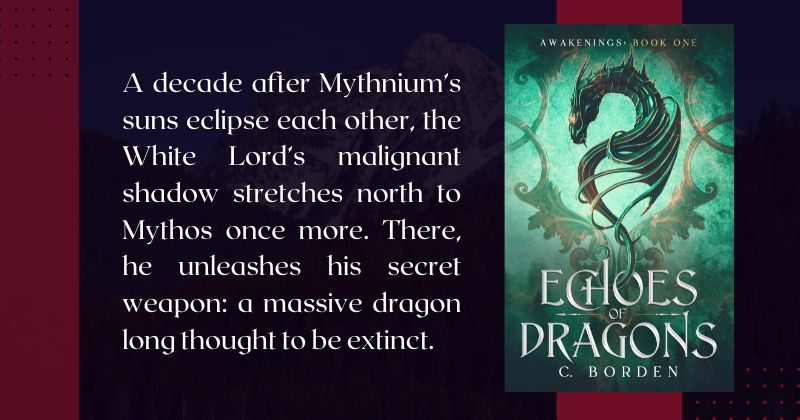
Short Author Bio
C. Borden is an avid reader and most enjoys the richness of fantasy and science fiction, which inspire her to write stories of her own. Drawing inspiration from the people and places that have touched her life, her works include lifelike characters, places readers wish they could visit, and storylines that fully engage her readers. Though her first published works are fantasy short stories and a fantasy novel, she is also a Christian and fiction author.
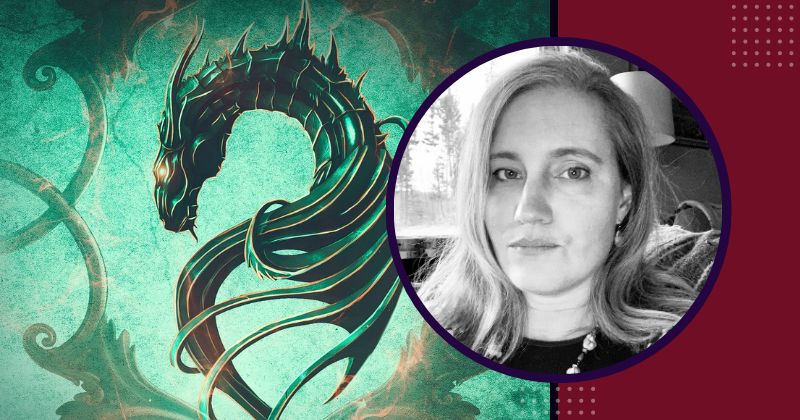
Elevator pitch for Echoes of Dragons
When their paths intersect and danger from the south grows, unlikely companions face an uncertain new world where echoes of dragons come to life.
Back cover text of Echoes of Dragons
A decade after Mythnium’s suns eclipse each other, the White Lord’s malignant shadow stretches north to Mythos once more. There, he unleashes his secret weapon: a massive dragon long thought to be extinct.
Three groups of travelers set off on separate journeys, drawn toward the elven city of Elmnas and the answers they hope to find within. Along the way, they face strange factions of creatures united against them as the White Lord’s influence grows.
As their paths intersect, the travelers face an uncertain new world where echoes of dragons come to life.
Interview Questions
Mythnium Series
Q: Your bio mentions that you draw inspiration from the people and places that have touched your life. Can you share some specific instances where real-life experiences influenced the creation of characters or settings in your Mythnium series?
A: Because I have such an active imagination, I am often living in real life, but taking the places I am in and picturing them in my mind. One example is when I was able to visit Regensburg, Germany, I was able to see how the old Roman ruins, roads, walls, and buildings were incorporated into the modern city. I was completely inspired by this very real example of old meeting new.
Later, as I was building one of the cities of Mythnium, I had Regensburg in my mind. Farcaste Reach is one of the few surviving cities of a catastrophic world-wide event, but even as a surviving city, it is now new, expanded, modern to its era. Granted, I don’t touch on that in Echoes of Dragons – it has not been relevant to the story, but it has added a facet to world-building.
Another, much more recent example is of inspiration I have had from nature itself. On one of my daily walks, I saw a wound in a tree. The bark was peeling away from the trunk, and sap was oozing out. Within the span of that wound, I saw the face of an old woman with an owl on her shoulder. That spawned research into wood nymphs, sprites, and dryads. So now I am writing a short story about a hamadryad (tree spirit) set in Mythnium just after the Cataclysm.
I remember visiting Trier when we were on holiday, back when I was in my early teens. I was particularly impressed with the Porta Nigra, and I also remember walking some of those old Roman roads. That definitely left a lasting impact. I can totally see how that inspired Farcaste Reach.
Q: Fantasy and science fiction are genres known for their world-building. Can you tell us about the process of creating the world of Mythnium? How do you strike a balance between familiar elements and originality to make your world unique?
A: Oh, well, the process for building Mythnium is on-going. I spend so much time working to make Mythium real: creating places, cultures, religions, politics, ideologies, sciences. The scope of Mythnium, beyond the book and short stories about her, is massive. Of course, I want Mythnium to be unique among other fantasy realms, and different from real life, but not so different and unique that every new thing has to be taught and explained.
I think that is one reason I love writing the short stories. While they are mainly character sketches or character introductions, they also peek into Mythnium, really allowing me to share more of Mythnium without info dumping too much in Echoes of Dragons (and beyond).
Though to be fair, I still info dumped a lot in Echoes, I’ve been told. ::smirk::
Q: Echoes of Dragons introduces us to multiple groups of travelers with their separate journeys. How do you approach crafting and interweaving the storylines of different characters, ensuring they contribute to the overarching narrative?
A: Interweaving the different groups wasn’t difficult in Echoes of Dragons. I already knew exactly where I wanted them to be at the start, and where I wanted them to be at the end. The difficult part was reining in my characters and making them stick to the path in my mind. Even so, one group diverted on a side trip not originally in my mind, and before I knew it, their path had deviated so far off, I had to go back and add a scene that forced them back into the right direction to make sense for the overall story.
Now, in the second book, Companions of Dragons, I am having a harder time keeping the interweaving plots and journeys on track. As a pantster without an outline, I basically write notes for chapters, and then follow a plot through the various chapters until it is concluded. This time, because the plots end in places that will lead into book three, I am finding it harder to make sure they are relevant to the second book. It’s one thing for me to know and understand the relevance, but making sure I write it so the reader grasps that is much harder to accomplish.
Q: Dragons are a central theme in your book. What is it about dragons that fascinates you, and how do you add your own twist to this mythical creature in Echoes of Dragons?
A: Dragons are meant to be fierce and threatening. In most lore, they are, and rightly so. I really appreciate a good terrifying dragon as a representation of evil and darkness. I think what fascinates me so much about dragons is the sheer size of the creatures. No matter where the lore originates, these creatures are giant, nearly indestructible, sometimes sentient beings. Intriguing.
Now, I don’t know how much of a twist the dragons of Mythnium take, but the dragon species, which is sentient, is made up of four races, two of which are humanoid. They aren’t shifters, they can’t transform, and there are real unique physical attributes that clearly define each race. I introduce only one of the races in Echoes of Dragons, but readers will get to discover the other races in Companions of Dragons.
Oooh! I love that. Four different species of dragons. As you know, I have several different types of dragons in my series “Curse of the Fathers”, too, but I think I my world, these are just different subspecies. And yes, I agree: They are meant to be awesome, and terrifying. That’s how I like my dragons, too.
Q: Your book’s back cover text mentions the White Lord’s malignant shadow and strange factions of creatures. How do you go about creating compelling antagonists and building tension throughout the story?
A: Ha! Got me stumped there.
I wing it.
Writing the scenes with the White Lord is such a stretch for me. He exudes so much power, rage, and need for destruction. But trying to write him effectively is such a challenge. I struggle with showing real evil without going too far, because I don’t want to cross into dark or grimdark fantasy. That is not the audience I want to attract because I can’t maintain that kind of storytelling. So, putting a leash on the darkness while still keeping the antagonists terrifying, and maybe even relatable in some way, pushes me to step outside my comfort zone. I honestly have no idea if I am making them compelling or building tension effectively, but I sure am trying.
Background
Q: Your background as a US veteran must have given you unique experiences and perspectives. How, if at all, has your military service influenced your writing, particularly in the fantasy genre?
A: My military experience taught me one key lesson: every individual deserves respect. That lesson has not yet bled into my writing, because it is a hard lesson to try to convey effectively. If I do ever try to convey it, I will most likely insert a real event that happened to me at the very start of my time in the military. I don’t want to spoil it, but let’s just say that a conversation with a friend, a person of another belief set, challenged one of my foundational beliefs, and rocked me to my core. The challenge bolstered my faith in the end, but the lesson about the individual changed me and my outlook on this world.
“Every individual deserves respect.” That really resonates with me. Respect is so important.
Q: Montana’s mountains provide a stunning backdrop for your writing space. How does your natural environment influence your creativity and writing process?
A: I find nature to be fascinating and awe-inspiring. While I prefer the mountains I live in, I find equal influence and inspiration from deserts and ocean, plains and rolling hills. There is a perfection in nature that cannot be denied. The more I am immersed in it, the more alive in mind and body I am.
To be honest, if I wrote the way I really, really want to, to really focus on the world, nature, systems and cycles, my writing would be more akin to Michener, or Jordan – too much exposition, too heavy, too laborious. And trust me, even though I am inclined to write that way, as a reader, I know how taxing it is to read books so focused on the foundations of a world rather than the beings in the world, so I try to keep it lighter.
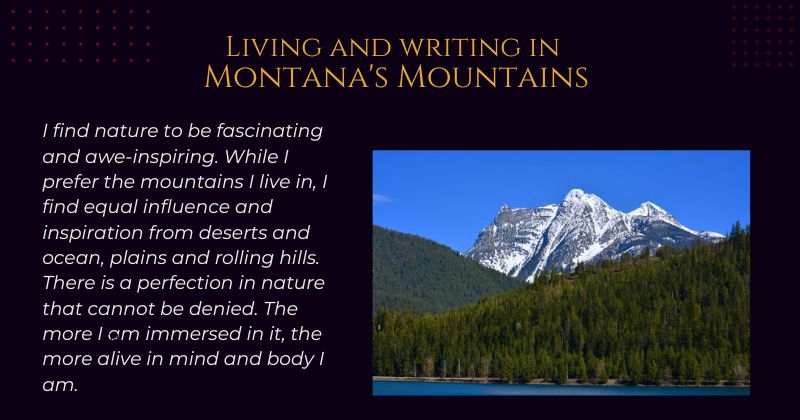
Q: As a Christian and fiction author, do you find your faith influencing the themes or messages in your Mythnium series? If so, could you share some insights into how your beliefs shape your storytelling?
A: I think my faith seeps into everything I write, though in the case of my fantasy writing, it is wholly unintentional. But writing is putting out an extension of myself, and I embrace that fact. This means that the lines between good and evil will be more clearly drawn, that even the evil can be redeemed, and that every character will have a choice, and will have consequences, good or bad, based on their choice.
Writing
Q: Echoes of Dragons is described as a tale where unlikely companions face an uncertain new world. What attracts you to explore themes of companionship and uncertainty in your storytelling?
A: I think I enjoy exploring these themes because of personal experience. I have always been a loner, a wall-flower, a late-bloomer, whatever word you might use to describe an outcast. Ironic, though, because I know people around me worked hard to include me – I just was and am naturally a fringe type of person. I prefer to let others take the stage, let others lead, and I am happy to support any way I can.
However, this means I am often thrown in with other outsiders. I have found the most incredible friendships and companions as a result. Unexpected. Some lasting. Some for just a season. And that feeds the uncertainty. A loner I am, and also a traveler, a gypsy, a nomad. This means, I’m always uncertain of what comes next, always waiting for the next, the new, the falling away, the coming of something different. I don’t think that is necessarily a bad thing, but it definitely shapes my real life, and as shown in Echoes of Dragons, has become a theme in my writing.
Q: Can you provide some insights into your writing routine and habits? How do you manage to stay productive and motivated while working on your projects?
A: Insights into my writing routine. Well, at the moment, there is no routine.
I really try, but right now, because warm weather means gardening, hiking, photography are all calling to me, I basically make a list of things I hope to accomplish weekly and daily. Whatever doesn’t get done daily gets rolled over, and rolled over, and rolled over, until it does.
Now, when the cold and snow rolls in, my time outdoors will be cut in half, and then I live off a schedule. I block out writing time, project by project, and everything else gets worked around that schedule.
As for staying motivated – because of some health issues I live with, motivation is sometimes not nearly enough. I have to listen to my body, and on days when my body/mind refuses, no matter how insanely bad I want to work on writing, I have to step away and do something else – namely cuddle my cattens, read a book, or binge something on Netflix. ha!
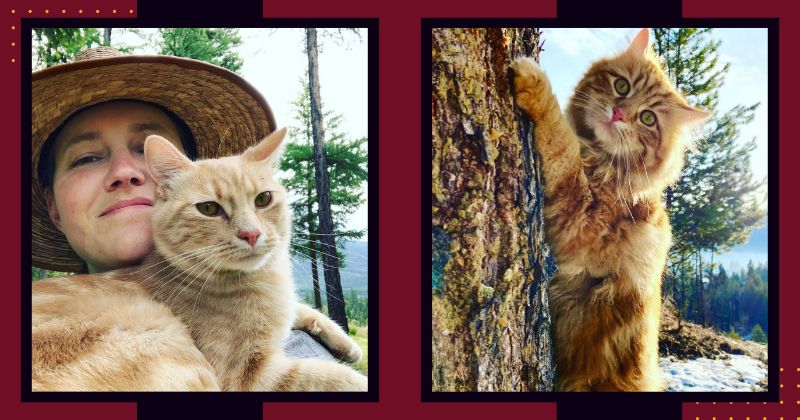
Hah! Netflix binging. As you know, I’m no stranger to chronic illness either and sometimes a good old Netflix binge is just about the most I can do. And, same as you, I really benefit from a good cuddle with my cats. And it certainly doesn’t hurt when they’re as gorgeous as yours.
Q: Are there any particular authors or books that have been significant influences on your writing journey?
A: I can’t say any one book or author has had a significant influence on my writing, but there are a few writers whose readers I’d like to attract: Terry Brooks, R.A. Salvatore, Anne McAffrey.
Beyond that, there are nearly a dozen Indie Authors who have proven to be generous and uplifting to writers like me. To name a few: yourself, Robert Sparks, EL Haines, SL Barrie, RaeAnne H, and more.
Aww, thank you. The feeling is absolutely mutual.
Q: Echoes of Dragons is a fantasy novel, but you also mentioned having published fantasy short stories. What are the challenges and rewards of writing in different formats, and do you have a preference between novels and short stories?
A: The main challenge in writing two formats for one fantasy realm is keeping the stories and timelines cohesive. I wrote the first eight short stories first and then wrote Echoes of Dragons, but in one of those short stories I described something pretty major, that I then contradicted in Echoes of Dragons. Regardless of the fact that I am completely capable of going in and making corrections to new editions, I refuse to do that. (Constantly going back to make corrections kills time creating new, so whatever is in print now, will remain as it is.)
So… Now, I’m working harder to make new short stories a little more distant from key characters and major plotlines of the novels. Sure, the characters or events in the short stories might be reflected in future novels, but as stand alone stories, they will have no bearing on the major events on Mythnium.
As for having a preference, I guess, I prefer short stories. I mean, I pop them out all the time. Granted, only a few will ever be published, but I write short stories about one thing or another all the time. They are fast, fun, and scratch that writing itch, especially when I can’t invest the time I need to for something in the novels.
Additional questions
Q: Do you have any freebies to offer?
A: I do! Currently, these freebies are exclusive to my newsletter subscribers. New folks can get a digital copy of The God-Keeper, one of my favorite new Short Stories also set in Mythnium.
Q: Do you have a website?
A: I do! www.authorcborden.com
Q: Where can we find you on social media?
A: I can be found on
- Facebook @authorcborden.official
- Instagram @authorcborden
- Twitter/X @AuthorCBorden
Q: Anything else you’d like to share with us?
I just want to thank you for this opportunity to share more about myself and my writing.
Thank you for being my guest today and allowing me to pick your brain.
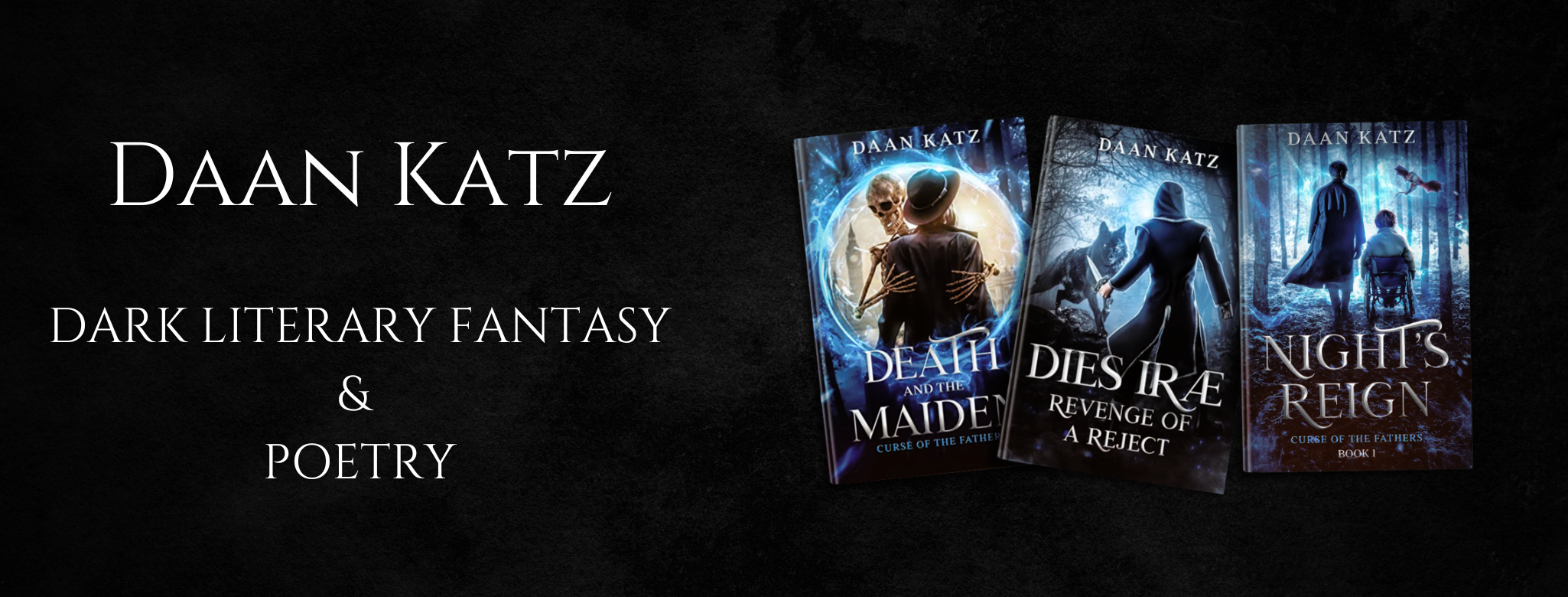

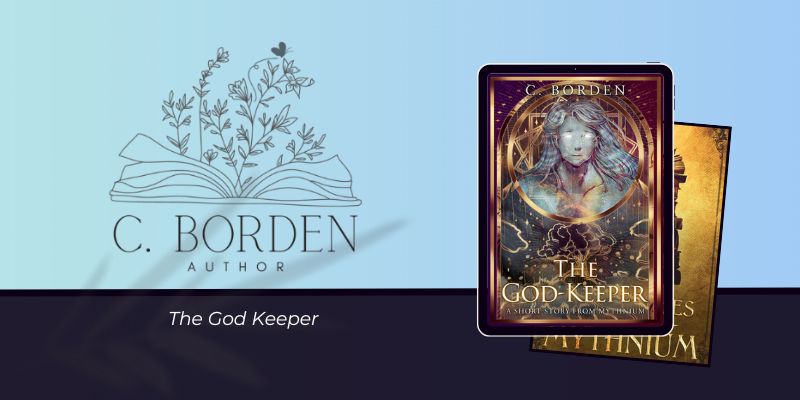
This was so much fun! Thank you for allowing me to share so much about how I write.
The pleasure was all mine.